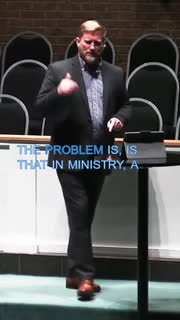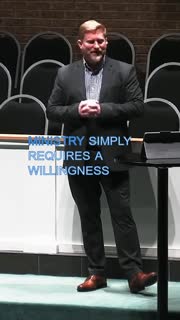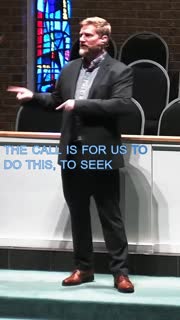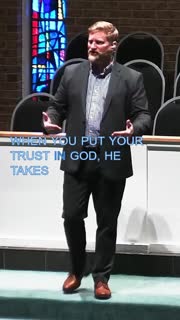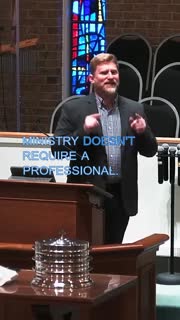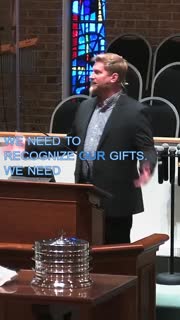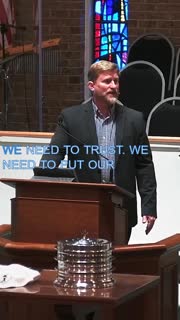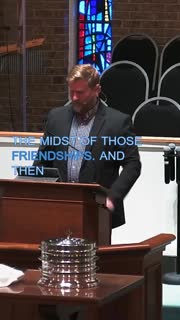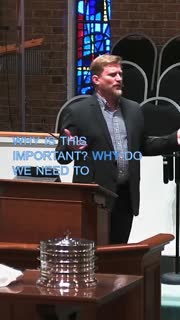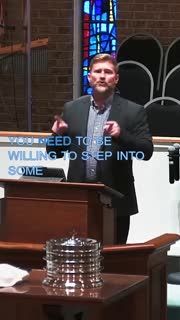Empowering the Next Generation for Christ's Ministry
Devotional
Sermon Summary
Bible Study Guide
Sermon Clips
1. "The problem is, is that in ministry, a lot of times we think we have to be very prepared. We've got to have it all together before we can actually do something for God. And that's so not true. And even when it comes to ministry, sometimes we think that we have to be professionals. Before I can hold a Bible study or before I can witness to somebody, I have to have all the knowledge and all the understanding because, you know, what if they ask me a question that I don't have an answer for?" [31:29] (27 seconds)
2. "Ministry simply requires a willingness to act. A willingness to be available. A willingness to step into some gaps. A willingness to recognize that there may be somebody out there that needs encouragement. Needs to hear the gospel. And you as young people, you are positioned in a great way. More than anybody else. We talk about the upcoming generations. We talk about Gen Z. We talk about these generations. We talked about it last week. The most equipped people to deal with a Gen Z person is a Gen Z person." [35:12] (36 seconds)
3. "The call is for us to do this, to seek the welfare of the city. In other words, as we live in this culture, we are supposed to go in and benefit our society. We're supposed to be a benefit to our society. And when we're a benefit, to our society, we too will be benefited. And then he goes on to say this, and I love this because this is a very familiar passage of scripture. We've heard it a lot. I love that God sets up this picture of living in Babylon for 70 years." [43:22] (34 seconds)
4. "When you put your trust in God, he takes you through the difficult trials. He does that over and over again. We see that in the New Testament too. God did the same thing with Peter. He did that with Paul. God would use them. And when they would find themselves in bad situations, God would deliver them. He did it time and time again. James 1 verses 2 through 4 says this, Count it all joy, my brothers, when you meet trials of various, for you know that the testing of your faith produces steadfastness." [49:58] (30 seconds)
5. "Ministry doesn't require a professional. All ministry requires is somebody who is willing to act, right? And that can be a young person. It can be an adult. It can be a professional. It can be a lay person. But it's not about what your qualifications are. It's about your willingness to act, to step in and do something at whatever level you're on and whatever situation you're in. God wants to use you." [02:19:08] (29 seconds)
6. "We need to recognize our gifts. We need to recognize the gifts and the talents and the skills that we have. We need to do an inventory of who we are and the skills that we possess and ask, how can we take these and use it for the benefit of the kingdom? As I said, I'm a preacher. My role is to talk. And so I talk. And I have a skill in that. It may not be a great skill. I'm continually working on it. But that is a skill that God has given me to use. Not everybody has that skill. But you have other skills." [02:29:02] (34 seconds)
7. "We need to trust. We need to put our trust in God. We need to put a trust in the faith that's been in us. Daniel 3, 16 through 18, talking about Shadrach, Meshach, and Abednego, familiar story. They're getting ready to be tossed into the fiery furnace. Shadrach, Meshach, and Abednego answered and said to the king, oh, Nebuchadnezzar, we have no need to answer you in this matter. In other words, what they're saying is if you don't bow down, if you don't relinquish your religion and bow down to our religion, then you're going to be cast into the fire." [02:32:54] (35 seconds)
8. "Focus on friendship and relationship. In other words, if you're a believer, don't go in saying, I'm going to witness to this person, or I'm going to bring the good news. I'm going to bring the gospel to them. Just be a friend. Build a relationship with them. Build connection. You're already doing that. If you're a Gen Zer and you're in a high school, you've already got your friends. You've got friends. You've got believing friends and you have non-believing friends. Maintain those friendships. Build those friendships. But be a light in the midst of those friendships." [02:41:11] (60 seconds)
9. "Why is this important? Why do we need to do these things? First of all, it's what we're called to do. As I mentioned, the Great Commission, going to all the world, preaching the gospel. When we do that, we're being faithful to the gospel. We're being faithful to the thing that we've built our lives upon. It calls us to go out and to do these things. But also, it allows us to be faithful to our Lord. It allows us to walk with him. We know to live out the life that Jesus lived, live out a life of love and care and seeking the welfare of those around." [02:44:00] (35 seconds)
10. "You need to be willing to step into some things as well. You need to be willing to seek out people that can lead you and guide you and mentor you. You need to seek out opportunities. I'm going to tell you, I'm available. As your pastor, I'm going to tell you, I'm available. Pastor, I'm available to you at any age. I want to be there to be a strength for you, but I can't do it on my own. That's an old school way of thinking about the church, that the pastor has to do everything. If the pastor has to do that, the pastor has to do all the mentoring, all the training up, all of that, it's just not going to happen." [02:45:26] (34 seconds)
Ask a question about this sermon
2. "Ministry simply requires a willingness to act. A willingness to be available. A willingness to step into some gaps. A willingness to recognize that there may be somebody out there that needs encouragement. Needs to hear the gospel. And you as young people, you are positioned in a great way. More than anybody else. We talk about the upcoming generations. We talk about Gen Z. We talk about these generations. We talked about it last week. The most equipped people to deal with a Gen Z person is a Gen Z person." [35:12] (36 seconds)
3. "The call is for us to do this, to seek the welfare of the city. In other words, as we live in this culture, we are supposed to go in and benefit our society. We're supposed to be a benefit to our society. And when we're a benefit, to our society, we too will be benefited. And then he goes on to say this, and I love this because this is a very familiar passage of scripture. We've heard it a lot. I love that God sets up this picture of living in Babylon for 70 years." [43:22] (34 seconds)
4. "When you put your trust in God, he takes you through the difficult trials. He does that over and over again. We see that in the New Testament too. God did the same thing with Peter. He did that with Paul. God would use them. And when they would find themselves in bad situations, God would deliver them. He did it time and time again. James 1 verses 2 through 4 says this, Count it all joy, my brothers, when you meet trials of various, for you know that the testing of your faith produces steadfastness." [49:58] (30 seconds)
5. "Ministry doesn't require a professional. All ministry requires is somebody who is willing to act, right? And that can be a young person. It can be an adult. It can be a professional. It can be a lay person. But it's not about what your qualifications are. It's about your willingness to act, to step in and do something at whatever level you're on and whatever situation you're in. God wants to use you." [02:19:08] (29 seconds)
6. "We need to recognize our gifts. We need to recognize the gifts and the talents and the skills that we have. We need to do an inventory of who we are and the skills that we possess and ask, how can we take these and use it for the benefit of the kingdom? As I said, I'm a preacher. My role is to talk. And so I talk. And I have a skill in that. It may not be a great skill. I'm continually working on it. But that is a skill that God has given me to use. Not everybody has that skill. But you have other skills." [02:29:02] (34 seconds)
7. "We need to trust. We need to put our trust in God. We need to put a trust in the faith that's been in us. Daniel 3, 16 through 18, talking about Shadrach, Meshach, and Abednego, familiar story. They're getting ready to be tossed into the fiery furnace. Shadrach, Meshach, and Abednego answered and said to the king, oh, Nebuchadnezzar, we have no need to answer you in this matter. In other words, what they're saying is if you don't bow down, if you don't relinquish your religion and bow down to our religion, then you're going to be cast into the fire." [02:32:54] (35 seconds)
8. "Focus on friendship and relationship. In other words, if you're a believer, don't go in saying, I'm going to witness to this person, or I'm going to bring the good news. I'm going to bring the gospel to them. Just be a friend. Build a relationship with them. Build connection. You're already doing that. If you're a Gen Zer and you're in a high school, you've already got your friends. You've got friends. You've got believing friends and you have non-believing friends. Maintain those friendships. Build those friendships. But be a light in the midst of those friendships." [02:41:11] (60 seconds)
9. "Why is this important? Why do we need to do these things? First of all, it's what we're called to do. As I mentioned, the Great Commission, going to all the world, preaching the gospel. When we do that, we're being faithful to the gospel. We're being faithful to the thing that we've built our lives upon. It calls us to go out and to do these things. But also, it allows us to be faithful to our Lord. It allows us to walk with him. We know to live out the life that Jesus lived, live out a life of love and care and seeking the welfare of those around." [02:44:00] (35 seconds)
10. "You need to be willing to step into some things as well. You need to be willing to seek out people that can lead you and guide you and mentor you. You need to seek out opportunities. I'm going to tell you, I'm available. As your pastor, I'm going to tell you, I'm available. Pastor, I'm available to you at any age. I want to be there to be a strength for you, but I can't do it on my own. That's an old school way of thinking about the church, that the pastor has to do everything. If the pastor has to do that, the pastor has to do all the mentoring, all the training up, all of that, it's just not going to happen." [02:45:26] (34 seconds)
